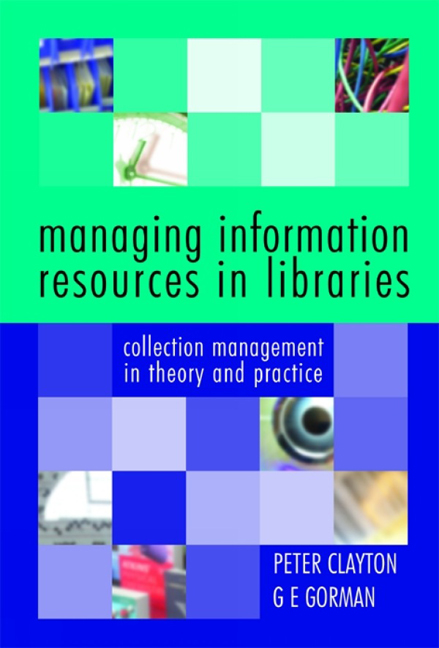Book contents
- Frontmatter
- Contents
- About the authors
- Preface
- 1 Managing information resources in context
- 2 Collection management and collection development policies
- 3 Conspectus
- 4 Resource sharing and co-operative collection development
- 5 Selection: policies and procedures
- 6 Selection resources
- 7 Acquisitions processes and procedures
- 8 Budget management
- 9 Collection evaluation and review
- 10 Preservation and weeding
- The literature of collection management Adela Clayton
- Index
- Frontmatter
- Contents
- About the authors
- Preface
- 1 Managing information resources in context
- 2 Collection management and collection development policies
- 3 Conspectus
- 4 Resource sharing and co-operative collection development
- 5 Selection: policies and procedures
- 6 Selection resources
- 7 Acquisitions processes and procedures
- 8 Budget management
- 9 Collection evaluation and review
- 10 Preservation and weeding
- The literature of collection management Adela Clayton
- Index
Summary
The new electronic world, which is transforming not only libraries but also the organizations that they serve, makes the role of every information professional more complex; all of us now need additional knowledge and skills. New entrants to the profession simply must be up to date in this area – it is, after all, one of the few realms in which they may be able to compete successfully for a job against their more experienced colleagues. As a result, every library school now offers online and internet units which expose and train students in this area.
Several library educators have pointed out the problems involved when library school curricula are constantly added to, but nothing is taken away: over-teaching and over-assessment on the one hand, or superficiality on the other. Unfortunately, when looking for something to omit, many schools have chosen collection management. Isn't this, after all, now being superseded by the very electronic information sources being taught in its place? We beg to differ – and know that we have good company in doing so – but the fact is that many new graduates have had little or no exposure to this traditional component of information education, despite its ongoing, even growing importance. This book is for them.
It is also for two other categories of librarian: those who did indeed study collection management (or ‘acquisitions’ or ‘collection development’), but so long ago that little of what might have been taught remains; and those who know that their own knowledge desperately needs to be updated to take account of the ubiquity of electronic information sources.
It follows that we, the authors, see you, our readers, as our professional colleagues, either now or in the immediate future. We believe that the management of information resources in libraries is of increasing, not decreasing, importance in an increasingly digital world; and that librarians are well placed to provide leadership in this new century. But to do so they must see how their traditional skills of analysis, evaluation, synthesis and communication are no less relevant than they ever were.
- Type
- Chapter
- Information
- Managing Information Resources in LibrariesCollection Management in Theory and Practice, pp. xi - xviPublisher: FacetPrint publication year: 2006

